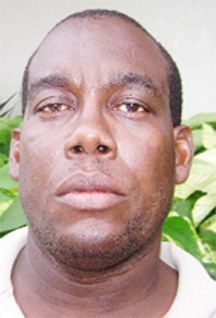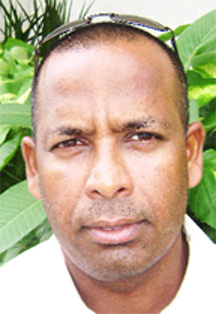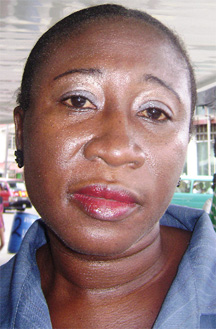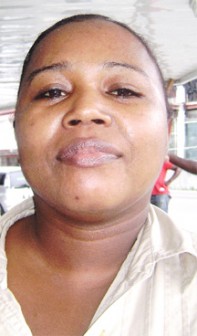This week we asked the man and woman in the street whether they thought deportees should be given a second chance on their return to Guyana and whether some form of public assistance should be provided for them by the government or other institution to help them get back on their feet.
Interviews and photos by Abigail Semple and Frances Abraham
 Harold Woodman – teacher: ‘Yes they should be given a second chance. That would be the humane thing to do. You don’t know the position they were in to cause them to do it. And it depends on the laws of that country. However, I would limit the assistance to job opportunity and education, nothing monetary. The government should have some form of assessing these persons, for monitoring and regulation. And also it should depend on the crime they’ve committed. I’m not sure about monetary assistance since some Guyanese work here for so many years and have contributed so much and they are not getting any assistance.’
Harold Woodman – teacher: ‘Yes they should be given a second chance. That would be the humane thing to do. You don’t know the position they were in to cause them to do it. And it depends on the laws of that country. However, I would limit the assistance to job opportunity and education, nothing monetary. The government should have some form of assessing these persons, for monitoring and regulation. And also it should depend on the crime they’ve committed. I’m not sure about monetary assistance since some Guyanese work here for so many years and have contributed so much and they are not getting any assistance.’
 Joseph Roberts – private sector employee: ‘They should be given assistance when they come back to Guyana, because they would be idle. Therefore they should be given a job or an institution should be provided where they can learn a trade that will keep them occupied.’
Joseph Roberts – private sector employee: ‘They should be given assistance when they come back to Guyana, because they would be idle. Therefore they should be given a job or an institution should be provided where they can learn a trade that will keep them occupied.’
 Akbar Khan – self employed: ‘No, but they can have a community formed and those drug addicts should be placed in rehab. When they are clear of that they should then train them in an area so they can go out and find a job.’
Akbar Khan – self employed: ‘No, but they can have a community formed and those drug addicts should be placed in rehab. When they are clear of that they should then train them in an area so they can go out and find a job.’
 Patricia Gomes – housewife: ‘It all depends on what they got deported for. If it’s a criminal record, then no, not a blind dime. But if it’s simply overstaying their time, then yes.’
Patricia Gomes – housewife: ‘It all depends on what they got deported for. If it’s a criminal record, then no, not a blind dime. But if it’s simply overstaying their time, then yes.’
 Shannon Heyliger – private sector employee: ‘I think they should be given a second chance depending on the extent of the crime. Everybody should be given a second chance, but if it’s something serious, then it’s necessary for them to be monitored.’
Shannon Heyliger – private sector employee: ‘I think they should be given a second chance depending on the extent of the crime. Everybody should be given a second chance, but if it’s something serious, then it’s necessary for them to be monitored.’
 Norma Hughes – public sector employee: ‘Well, giving them that kind of assistance will help them to reintegrate back into society, especially if they have been deported for drug related crimes, because you wouldn’t want them going back to that. Also they should not just be given monetary support, but support in all forms, such as rehab and moral support. This way they will not feel rejected in society because of the stigma placed on them, and this may even help to change them to become a better person.’
Norma Hughes – public sector employee: ‘Well, giving them that kind of assistance will help them to reintegrate back into society, especially if they have been deported for drug related crimes, because you wouldn’t want them going back to that. Also they should not just be given monetary support, but support in all forms, such as rehab and moral support. This way they will not feel rejected in society because of the stigma placed on them, and this may even help to change them to become a better person.’
 Odessa Alleyne-Chester – public sector employee: ‘I think they should be given a second chance, but away from other persons, and depending on the crime they should be counselled and advised. Some sort of facility should be arranged for this, because instead of benefiting society they will harm it.’
Odessa Alleyne-Chester – public sector employee: ‘I think they should be given a second chance, but away from other persons, and depending on the crime they should be counselled and advised. Some sort of facility should be arranged for this, because instead of benefiting society they will harm it.’
 Floyd Christie – private sector employee:’ Yes, they should be given assistance, but not right off the bat. I think they should be offered counselling first and those that the counsellors deem mentally inclined to do better and who he/she sees genuinely wants to better themselves should be given assistance. Assistance should also be given based on the offence committed.’
Floyd Christie – private sector employee:’ Yes, they should be given assistance, but not right off the bat. I think they should be offered counselling first and those that the counsellors deem mentally inclined to do better and who he/she sees genuinely wants to better themselves should be given assistance. Assistance should also be given based on the offence committed.’
 Juanita John – teacher: ‘Deportees are like many who have made mistakes, and they should be given a second chance at life. If Christ can forgive hard core criminals, why should we do any different? We should not condone the wrongs they have done, nor should we look down on them as lesser or unworthy individuals. We must give them a chance.’
Juanita John – teacher: ‘Deportees are like many who have made mistakes, and they should be given a second chance at life. If Christ can forgive hard core criminals, why should we do any different? We should not condone the wrongs they have done, nor should we look down on them as lesser or unworthy individuals. We must give them a chance.’
 Clinton Dubissette – student: ‘Yes, I think that they should be given a second chance and offered some form of public assistance. This is so because this is their native land and they belong here. They should be treated as equal Guyanese like the rest of us, and they should be able to have health care and other assistance from the government and the public at large. No one is perfect. This is my view on this deportee issue.’
Clinton Dubissette – student: ‘Yes, I think that they should be given a second chance and offered some form of public assistance. This is so because this is their native land and they belong here. They should be treated as equal Guyanese like the rest of us, and they should be able to have health care and other assistance from the government and the public at large. No one is perfect. This is my view on this deportee issue.’
